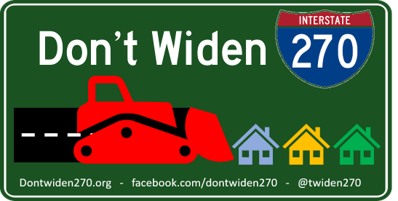The toll lane plan Gov. Hogan left behind is a tangled mass of moving parts: legal, political, environmental, financial, procedural, and on and on.
The public and its advocates have done a remarkable job of shining light on the dark corners of this scheme (see ‘Stakeholders’ Table’, below). But as always, much remains hidden.
Here’s what we know about the project’s status:
Transurban & team officially have until March 21, 2023 — the deadline set by Hogan — to present their plan to the Moore administration.
Paul Wiedefeld, former head of WMATA and Metro, has been confirmed as State Transportation Secretary. He’ll be key to toll road decision-making.
Good news: the Montgomery County Council/County Executive drafted a transportation priority letter to MDOT that, instead of endorsing the project, calls for “careful and transparent analysis…to evaluate the necessity of public-private partnership…”
Positive sign: a 2/11/23, Washington Post article quotes a Moore spokesman about the toll lane project: “Governor Moore’s first priority is to review solutions through the lens of equity, sustainability, environmental protection and environmental justice.” (See ‘Separate and Unequal’, below.)
The Sierra Club-led Federal lawsuit to “halt the…toll lane project because of an insufficient and error-filled environmental review” is active and ongoing.
Our broad coalition of activist organizations is accelerating its role as truth tellers/fact checkers/supporters of our elected allies. The coalition posted this extensive list of smart, effective alternatives to the scheme and these must-read resources.
Action Item
The toll lane project is not over; we need to make sure our voices are heard. Share this update with family, friends, and newcomers to your area. Encourage them to join our mailing list at DontWiden270.org. Encourage them also to follow our trusted partners: Citizens Against Beltway Expansion (CABE); the Sierra Club of Maryland; Maryland Advocates for Sustainable Transportation (MAST); and the Maryland Transit Opportunities Coalition (MTOC). When people understand the truth about this project, they say ‘no’ to private toll lanes (see ‘Wash Post Poll’, below).
“Separate and unequal” toll lane P3 can never pass through Moore’s equity lens
If any private, for-profit toll lane plan goes forward, it will stand –literally -- as a concrete divider of the public into separate and unequal tiers. On one side -- the few able to pay exorbitant rates for faster, safer travel. On the other side, most of the public, who are consigned by a for-profit business model, to permanent congestion, worsening and new bottlenecks, and increased accidents.
Contrary to the marketing words of proponents, the project would use public infrastructure and public funds to lock in the degradation of social, economic, and environmental justice for generations.
It’s inconceivable that Governor Moore, with his welcome and intense focus on equity, would let that happen on his watch.
Especially not when the toll lane project would decimate the 8th most diverse city in the entire US, Rockville (which has been sounding the alarm for years); make travel worse than it is now for the 1st and 3rd most diverse cities in the US — Germantown and Gaithersburg — and clearly target the 4th most diverse, Silver Spring.
Especially not when the state has admitted the project will need government subsidy. The tax dollars of middle- and lower-income drivers who can’t afford the tolls would go to build express lanes for the wealthy few.
Especially not when so many smart, equitable alternatives exist. For instance, elements of MDOT’s hugely successful, state-funded I-270 Innovative Congestion Management system could be implemented on I-495 and other roads much more quickly and at vastly less cost and risk than the current P3. MARC train expansion, under study for years, already has wide acceptance.
MDOT's Innovative Congestion Management, 9/9/2021. MDOT
Sec. Wiedefeld: Bring public activists to the stakeholders’ table
Secretary Wiedefeld told a state Senate committee, “I need to get out and meet with a lot of the stakeholders about [the toll lanes]. We need to build a consensus about what we want to do there” (time stamp 2:14:15).
The Secretary will find no group of stakeholders who’ve spent more years (5) wading into as much opaque MDOT documentation (tens of thousands of pages), consulting more nationally known technical and legal experts, supporting more elected allies, and spending more time on research, study, and analysis of every aspect of the P3 project than the coalition of public activists/advocacy organizations opposing the project.
Collectively, we’ve documented and shared the work we’ve done and our wide-ranging findings.
Representatives of our broad coalition will be key to helping Sec. Wiedefeld arrive at accurate conclusions about the P3. The Secretary's office can contact any of the advocacy organizations linked in the Action Item above to get activists and experts involved in the Secretary's stakeholder process.
Wash Post poll confirms what Wash Post keeps denying…
People don’t want sky-high tolls, induced congestion, and new bottlenecks – especially people who will be directly impacted. A Washington Post-University of Maryland poll shows 54% of Montgomery County respondents oppose the private toll lane project (of course they do) vs. 40% in favor. 50% of Prince George’s County respondents oppose the project vs. 42% in favor.
To see the poll data, go to Question 12 here, then scroll across to the Maryland Regions section, columns Y and Z.
NOTE: The Post’s implacable/irrational support for the toll lane scheme (to date they’ve published 20 pro-toll lane editorials) is now spilling over to its news reporting. See this posting about it from Transit for Maryland.

